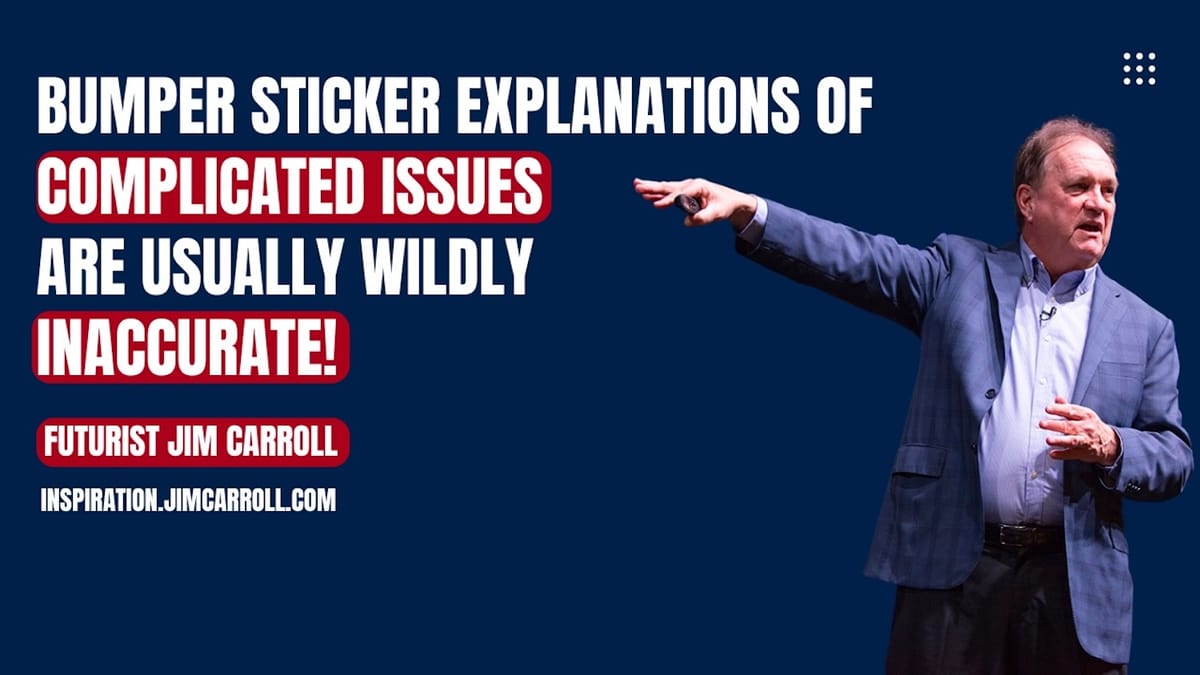There are a lot of people with instant insight on everything and yet who are experts at nothing.
Isn't that the way it goes?
If you spend any time talking with anyone today, it would seem that they are suddenly experts on tariffs and their impact on regional, national, and local economies. Everyone is offering up concise statements of what it means, where it will go, and what will happen. I prefer to listen to global trade experts and economists - folks who are trained in this stuff. In the same way, I'd rather listen to a PhD in vaccine medicine than some quack who gets his information off an obscure conspiracy theorist's Website.
That's why ideas like "trickle-down economics will work" statements are always such a false promise. The notion that tax cuts for the wealthy and corporations automatically benefit everyone has been repeatedly challenged by economic research showing limited "trickle-down" effects and increasing wealth inequality. And yet the bumper sticker wisdom lives on.
Why does this happen?
"Bumper sticker" phrases - catchy one-liners about complex issues - sacrifice accuracy for memorability. They fail to address the multiple perspectives, historical context, systemic factors, competing values, and technical details that complex problems involve. They often aren't based on much more than opinions.
The fact is, oversimplifying leads to:
- Overlooking cause-effect complexities
- Creating false either/or scenarios
- Substituting emotion for analysis
- Reinforcing existing beliefs
Good leaders know when simplicity works and when issues demand a deeper explanation. They engage with complexity and guide others through it thoughtfully. They also know that while bumper-sticker wisdom can be popular, it causes more problems than good. Here are "25 Reasons Why "Bumper Sticker Wisdom" Can Be Problematic"
- Too Simple - Complex issues need a deeper understanding than just a sentence or two.
- Either/Or Thinking - They make issues seem like they have only two sides when there are usually many options.
- Missing Background - They leave out important history and context needed to understand the issue.
- Confirmation Bias - People like phrases that match what they already believe, which limits their thinking.
- Playing on Emotions - They appeal to feelings instead of facts to persuade people.
- Discourages Thinking - Short sayings don't encourage people to analyze or question the topic deeply.
- Unclear Words - Limited space leads to vague wording that can be interpreted in different ways.
- Group Identity - Many phrases are just ways to show which group you belong to rather than share real information.
- Faulty Logic - They often contain logical mistakes that people don't notice because the phrase is so short.
- False Understanding - Simple phrases make people think they understand complex topics when they don't.
- Cherry-Picking Facts - They only present selected facts that support one view, not the complete picture.
- Bad Policies - Government policies based on oversimplified ideas usually don't work well.
- Can't Be Disproven - Many phrases are worded so they can't be proven wrong, which isn't honest.
- Divides People - Simple sayings often increase division by eliminating the middle ground.
- Reduces Understanding - They make it harder to understand people with different views.
- Hard to Correct - Once people memorize these phrases, they resist changing their minds even when shown evidence.
- Doesn't Adapt - Short sayings don't account for how situations change over time.
- Ignores Experts - They lead people to trust simple explanations over expert knowledge.
- Oversimplifies Morality - They reduce complex ethical issues to simplistic right/wrong judgments.
- Avoids Responsibility - Simple phrases can be used to dodge blame and ignore real causes.
- Promotes Groupthink - They encourage people to accept ideas without questioning them.
- False Comparisons - They often compare things that aren't similar.
- Intentionally Vague - Some use unclear wording to avoid taking clear positions while sounding decisive.
- Blocks Learning - People who think they already understand issues through simple phrases often resist new information.
- Cultural Stereotypes - They reduce complex cultural traditions to stereotypes or oversimplifications.
Ironically, my statement about bumper stickers is itself a bumper sticker - though one that points out its limitations!
Perhaps we need simple reminders to look beyond simplicity.
Futurist Jim Carroll is willing to admit that perhaps many of his Daily Inspiration posts contain bumper-sticker wisdom. He lives and owns the contradiction.

